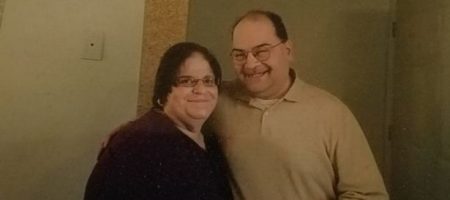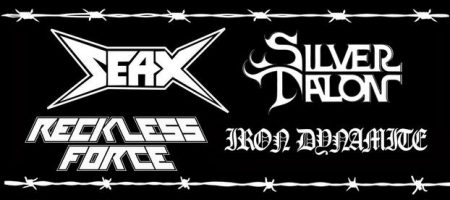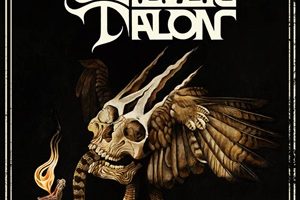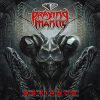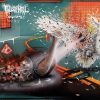Silver Talon – Delve into Decadence
Friday, 2nd July 2021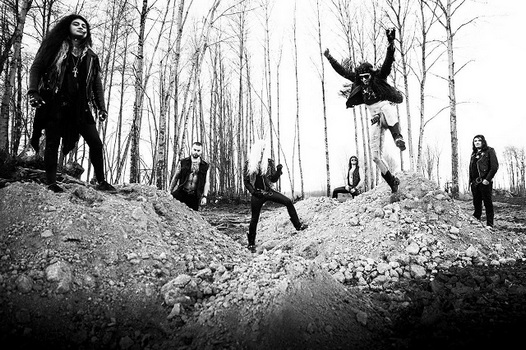
Forming out of the remnants of Spellcaster, Silver Talon is a group of musicians who approach the heavy metal style with a darker, power/progressive slant. Signing with M-Theory Audio following their self-released Becoming a Demon EP, the latest full-length Decadence and Decay is ideal for those who love the wide array of atmosphere, thick guitar riffs and harmonies, plus progressive drum tempos and soaring multi-octave vocals that put artists like Nevermore, early Queensrÿche, and Yngwie Malmsteen on the map. We reached out to guitarist Bryce Adams Vanhoosen to get the scoop on the latest record, the expanded lineup that includes three guitarists and how that works in terms of responsibilities, plus specific touring stories, guest work with Andy LaRocque, and even thoughts on his current sci-fi reading.
Dead Rhetoric: Decadence and Decay is the first full album for Silver Talon – and your first effort with M-Theory Audio. Tell us about the development of the recording and songwriting and where you see the major differences between this outing and your 2018 Becoming a Demon EP?
Bryce Adams Vanhoosen: So, basically the writing for this album started immediately after we got back from tour in 2018. We released Becoming a Demon in October 2018, and in November we embarked on our first full US tour. We returned from that in December and started on the writing for what would become Decadence and Decay. We finished that up in few months, and we did a lot of pre-production for that over the course of 2019 and early into 2020.
The big difference in writing between the EP and the full-length, of course we had a couple of members leave, and a third guitar player in Devon Miller, who stepped in to handle guitar duties. We had Gabriel Franco on the EP, and he was also in Spellcaster, and the singer/main composer for Idle Hands/ Unto Others, as they are known as now. He co-wrote three of the songs on the Becoming a Demon EP, and he left the band shortly after we released it. With him out of the picture, his presence wasn’t there anymore so it left me and (vocalist) Wyatt (Howell) up to the writing and coming up with the general atmosphere for writing. And we went into a darker direction if you will.
M-Theory Audio. Going back to 2014-16, the tail end of Spellcaster. We had gotten ahold of Marco Barbieri, formerly head of Century Media, and he started doing management and artist development with Salem Rose Music. As Spellcaster we were interested in working with him under the managerial aspect, sort of out of a partnership. That never quite worked out, but when we started Silver Talon, after we released the EP, he was paying attention. He contacted us to tell us about the new record label. How would you like to work together to put out the first full-length? That started back in 2018, and it’s quite the lead up to working with them. It’s awesome to final come to fruition.
Dead Rhetoric: How did the idea come about on several songs to inject acoustic guitar work that contains neoclassical/flamenco textures – as it seems that you have specific ideas and atmosphere you want to add to these tracks with this work that differs from a normal heavy/speed/power metal act?
Vanhoosen: Yes, definitely. For me, a lot of it comes from probably my early love for the work of an artist like Yngwie Malmsteen. Almost the more progressive side of heavy metal, that sometimes has been frequently employed by somebody like Queensrÿche for example. Having the acoustic part to sort of balance with the heavy riffing, that’s always been something to me as a listener that has been appealing. To have that bit of contrast between the light and the dark, right? It almost makes the heavy stuff when it comes back in sort of even heavier, the drawing back of everything to emphasize the riffs that kick in.
Plus the atmosphere that you get from acoustic guitars and things like that. I don’t think that can be overstated how powerful of a tool that can be.
Dead Rhetoric: Given the fact the band as a sextet has three guitarists, how does the workload get divided out? Is it based on the specific needs of the song as well as putting the best players for the job in the right positions?
Vanhoosen: Yeah. It’s kind of … it is interesting. It’s formed out of necessity, because Sebastian (Silva) had some issues getting back into the country in 2019. We got Devon to temporarily do guitar duties, which turned into a more permanent thing. I think everybody has their own individual kind of specific talents. And that’s how we approach it. We wrote the album in late 2018, early 2019 – a lot of which was done before we started working with Devon, he came into a full album already in the works. But then once it came time to do the recording, we divided up the tasks. I think it sort of went down to who had the most bandwidth at the time, and who was capable of giving things the right amount of attention, additional strengths. I’ll do a lot of the rhythm stuff, Devon did another layer of rhythms behind that and additional harmonies. Then for the solos, we divided those up individually. And then, there is also element of Devon being able to provide really excellent background vocals.
We see the talents of a particular member and see if that member can do this in a specific way. We don’t think too hard about it, we do what is needed for the song.
Dead Rhetoric: Tell us about the work of Zach Ohren and Gabe Johnston as producers and what you believe they bring to the table for this record – and how was it to have King Diamond guitarist Andy LaRocque contribute a solo to “Resistance 2029”? What do you admire most about his playing over the years?
Vanhoosen: I’ll start with the first part of the question. Both Zach and Gabe, we worked with them before on the Becoming a Demon EP, in fact the entire production is the same between these two efforts but they sound very different. Zach is really good at putting things together and making sure that everything works from the interpretation standpoint. He can mix and edit drums very well. We started initially working with him on Spellcaster’s 2016 album Night Hides the World. That’s been a pretty standard thing. If you play something and he doesn’t feel like it’s up to snuff, he has no hesitation to tell you that. He has a carrot and stick approach, but he always gets the best out of us. For Gabe, he’s a local guy here in Portland. He’s invaluable to working with Wyatt specifically to get all of the vocal stuff together. Especially for this record, he stepped up and took what we wanted to do and learned from the EP, and took it to the next level. He has a really good ear, knows when particular vocal patterns are working good, I really enjoy working with him. The vocals on this album turned out really good.
And then, in so far as working with Andy. That was awesome. I wasn’t sure if he would actually say yes. If it would actually work out, so I didn’t try to get my hopes up too much at the initial emailings we did back and forth. He finally sent over the final recording of what he had, asked me what I thought of it. It was absolutely perfect. What I like the most about Andy’s playing – he’s in my top three guitar players that I admire and go to when I look to for inspiration – it’s the way he blends the technicality side of it without losing a good amount of feel and atmosphere. For the part we gave him in “Resistance 2029”, it’s a weird part – it’s over an acoustic backing that alternates between two oddly voiced chords. He took that and did something that was totally mind blowing and totally Andy LaRocque. It was a dream come true to have that.
Dead Rhetoric: Where do you see the major differences between Silver Talon in the studio versus the stage? What have been some of the more memorable or impactful shows to date that you’ve played, and how would you say the audience response has been?
Vanhoosen: Studio-wise, we have a lot of layers, and that’s difficult to do in a live situation. You have to scale things back a little bit, and focus on trying to match the sonic depth of something with an energetic type of thing. Live – there is so much stuff out of your control, especially a band at our level. We don’t really bring a sound guy on the road with us, so we are at the mercy of the local guy at the venue. The shows have to be focused on a lot more energy, we can control that, rather than the sonic delivery. It sounds weird because it’s all music, live you are sort of doing a bit of listening with your eyes as well, right?
At least for me, the energy is what we try to bring to a live performance. Some of the more memorable shows. We are still a little bit in our infancy. We have done a couple of US tours, we did one with Savage Master which was awesome. Probably the shows that stick out in my mind are not necessarily the ones that go the best. It seems like the stuff I remember is weird sort of things happen. In 2019 for instance we played at a DIY show, the sound equipment was a PA that somebody would have in their practice space. Amps, nothing mic’ed, a raw room kind of sound. Apparently there was a scheduling issue and we ended up playing only three songs. Which was a little weird and odd. And some guy got kicked out of the show for being too drunk, drove by afterwards in his car with a Glock and shooting it into the air outside of the venue. Definitely made for a memorable sort of experience. Philadelphia, 2018- we played at Kung Fu Necktie – our fog machines set off the fire alarm, and it cut power to the entire back half of the venue. The fire department came, and they were not super stoked that it was just fog machines. Apologies to the taxpayers of Philadelphia for that one.
Dead Rhetoric: What types of learning experiences / challenges did you take from your previous work in Spellcaster and apply to Silver Talon to hopefully make things easier, more consistent, or better all around in terms of the music, business, and friendship/relationship sides of the band?
Vanhoosen: Oh man. So much. Starting fresh with Silver Talon after being through the rigmarole with Spellcaster. It’s night and day. There is hardly anything that is the same in terms of the approach, Spellcaster was very much like five buds, drink beer together in the evenings and play music at the same time, so let’s go on tour. We didn’t really have any sort of business-minded sort of thoughts. We were really naïve I would say. Let’s play these shows opening for bigger bands, it’ll be awesome. Let’s do a tour, that would be cool. Let’s get signed, that’ll be awesome. But we didn’t sort of think about how that would play into or work and effect the kind of actual year over year planning. It was very by the minute, and did things more for fun which is great, but when it gets more like work and less like fun which when it comes to some tours…. We were driving eight hours between gigs to play to four people, that can get a little defeating in terms of the morale.
For Silver Talon, let’s do things the right way. Let’s not try to plan those types of tours, literally driving from place to place to four people and expecting that to get us somewhere. Let’s try to tour and play with bands bigger than us, and perform for their audience. Understanding how PR and promotion works. It was an eye-opening experience when one day in Spellcaster we realized there are people that put together campaigns for promotion. They are promoting your album, your tour, and it isn’t just people organically finding it. Because that was what we were under the impression would happen – if you build it, they will come. If it’s good they will find it, they will listen to it, and you will progress. Well, that is not how things work. There is a bit of planning and the way you approach things. We tried to do more correctly here.
Almost everything that we did in Spellcaster, we did the opposite of in Silver Talon. Except trying to make the best music, it’s the business part of it that I am glad we have gotten a second crack at it.
Dead Rhetoric: How do you view the landscape of the metal scene in 2021 – do you feel you’ve adapted well to the models of digital medium, social media platforms, streaming music sites, etc., and do you believe there is still a place for the physical product for consumers and collectors of all ages?
Vanhoosen: I would almost say the physical product is what you are – where you are making the most money and having the most impact as an artist. It’s just that… in this sort of day and age when people just hear about you. If you think about things in a corporate sense like a sales funnel, it used to be that people would hear about you, they would be interested, and buy your CD. And that would be the way things shake out. These days, there are a couple of more steps there. People hear about you, become interested, they will go to YouTube, Spotify, or some place to check it out, see what you are all about. If they like your sound, they will give you a follow on social media, and then they will check your social media, see what you are doing. Once it gets to a point where they are sort of invested in the band, when that music has been incorporated in their own psyche, a part of them, at that point they are willing to shell out money and get that physical product to hold in their hands. It’s like the music has become a part of them at that point, they want the physical thing to show the world. You end up having to carry people along to get them into the story, your musical journey and the story of the band as a whole.
As far as adapting, I don’t really remember a time before that. Social media has always been a big thing for me at least. Connecting to people on Facebook, Instagram, and YouTube, that sort of thing that’s always been there, what a band has done ever since the Myspace days. We are trying to do the best that we can. I’m sure there are things we could do better as far as the landscape, but there are only so many hours in the day.
Dead Rhetoric: Who would you say are two or three bands that have had the greatest impact on your views within heavy metal and how you would love to model your career arc next to? And how do you handle the balance between professional careers, family/relationships, and keeping things going strong with Silver Talon?
Vanhoosen: As far as bands we really look up to. I can’t speak for the rest of the guys in the band, but for me I look up to the trajectory that somebody like Warrel Dane for instance took, between his journey from Sanctuary to Nevermore and my journey from Spellcaster to Silver Talon. Plus, the fact that they never really went out to try to make a pop album. It seemed like they were always living life on their own rules, if people liked it, great – if not, better luck next time I guess. It doesn’t seem like a band like Nevermore, they did what they wanted to do and held artistic integrity above everything else. Bands like that – the term selling out is a loaded term these days, I wouldn’t frame it in that sort of light. But bands that always follow their own artistic integrity and try to do things on their own terms. That’s been something I look up to – early Queensrÿche is the same, at least through Operation: Mindcrime territory. I don’t think many people had done a full-on concept album in the space they were in. Bands that push the boundaries at what heavy metal can be.
In so far as balancing everything. I wish I had a definitive answer on how to do it. I’m still trying to master it myself. It can be difficult. Everybody in our band has a 9-5, and hope you are not tired enough during the evening to work on music and pursue that to express your creativity. And taking time off to tour, whenever that happens again, it’s always a constant struggle. Employers don’t like the idea of their employee that they’ve sunken time and money into suddenly taking off for say five weeks or so. If anything, we take it day by day and try not to focus too hard on one thing. You have to give yourself breaks, you take a vacation from your job and make sure that music doesn’t get to be too much of a drag.
Dead Rhetoric: What concerns do you have regarding the world that we live in today – and how do you think humanity in general will handle things coming out of this long COVID-19 pandemic?
Vanhoosen: Oh, man. I have a lot of concerns (laughs)! I’m concerned with shows getting back to normal, in a way that we can do it in an environment that’s going to be positive and conducive to everybody. There’s probably three camps of people. People that want everything to go back to normal right off the bat. People who are kind of tentatively hopeful, getting vaccinated and that sort of thing, and hope that life turns to normal at some future date down the line. And then there will be a lot of people in a camp sort of like a PTSD, agoraphobia – we’ve spent so much time being afraid that those people will take a while to leave their house and go out. Somehow we have to find a way to maybe appease and make everybody comfortable to get back together again. I don’t know how that is done. I would love to be able to see shows like they were in 2019 happen again. I have some concerns with the limited capacity, socially distanced look of doing shows. I don’t know how financially conducive that is going to be, or make a lot of people in the entertainment industry go into the red and able to break even. Finances before when things were normal, were a little touch and go. If you expect to make the same amount of money with less bodies, it’s something that can’t work math-wise.
We have to watch and see how it sort of shakes out. That’s where my mind goes to when it comes to the current state of the world.
Dead Rhetoric: You’ve been reading William Gibson’s book Neuromancer – a pioneer novel and credited with starting the science fiction subgenre known as cyberpunk. What have you enjoyed most about the book, and are there other sci-fi authors or writers you enjoy reading during your free time that you would recommend to our readers?
Vanhoosen: Starting with the William Gibson Neuromancer book- I literally just finished reading it this weekend. It’s great. I am still processing the whole thing in my brain. The layers of reality, and personhood, and personal identity, things like that. Some of the parts that I thought were more interesting that I have had a little more time to think about, how the artificial intelligence in the book sort of present themselves in a way that the person that they are presenting themselves to sort of understands. Using these masks of people, an AI character that gets presented differently a few chapters earlier in the book. You have more interactions with the AI character in the book than the actual person as a character. It makes me think about the state of all this UAP stuff that everyone is obsessed with. Science fiction becoming reality in a way. At the end of the book, the protagonist asks if he is god now? It makes me think if a sort of god was trying to interact with a human intelligence, would they use these different face masks and present themselves – an underlying nature of reality that may change from person to person? You could have this one thing that looks very different to multiple different people. That’s the philosophical way I’ve been thinking about some of the aspects of that book in particular. It was a great read and a page turner.
As far as other authors, I love the work of Philip K. Dick also. Another guy who is thrust into that cyberpunk genre, a patron saint associated with that.
Dead Rhetoric: Were you a fan of The Man in the High Castle, the Amazon Prime series based on his book?
Vanhoosen: I literally just started watching it. I’m on episode four of the first season. That seems like it’s really good so far. Very dark, very depressing (laughs). My wife is like I’m not watching this – you are going to watch this on your own. When the guy’s sister, niece and nephew are gassed, she said it was too much for her. This really pushes the Hell on Earth scenario. If there wasn’t that kind of sort of sci-fi aspect to it, with the film reels, the high castle, the multi-dimensional aspect of it, you would think about America being divided between the Japanese and the German Empires. What a dire situation that would be? How would the world ever recover? That’s mind blowing to me.
Dead Rhetoric: How do you see the next year going for Silver Talon in terms of promotion, shows, tours, festivals, or other activities?
Vanhoosen: Sebastian is also into Unto Others – they will be doing a tour with Behemoth and Arch Enemy in Europe later this year, probably about fall. For us, Silver Talon, we don’t have anything ironclad lined up. Next year in 2022 we will do a couple of festivals. Up in Vancouver, Canada we will do Hyperspace, and in Chicago we are doing Legions of Metal. Hopefully some tour opportunities will come down the pike after we get a little bit more of this pandemic situation under control. All the promoters and booking agents can still be leery. We will probably start working on material for our second album at some point this summer. We will definitely be keeping busy.
We are talking about doing a concept record – some of these nature of reality and sci-fi aspects may come up. We will have one foot in that, and one foot in the spiritual, occult sort of space.











